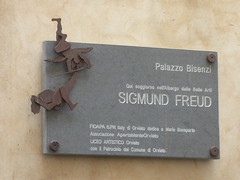Sigmund Freud


Sigmund Freud
(1856-1939)
friend of Adolfo Cozza and friend of Marie Bonaparte
Commemorated on 5 plaques
Sigmund Freud 1856-1939 founder of Psychoanalysis lived here in 1938-1939
20 Maresfield Gardens, London, United Kingdom where they lived (1938-1939)
Sigmund Freud Créateur de la psychanalyse Habita cette maison 1885-1886
English translation: Sigmund Freud Creator of psychoanalysis Habita this house 1885-1886 [AWS Translate]
Rue Gay Lussac, Paris, France where they lived
Au cours de son premier sejour a Paris en 1885 Sigmund Freud resida dans cet hôtel alors appele Hôtel de la Paix
English translation: During his first stay in Paris in 1885 Sigmund Freud resided in this hotel then called the Hotel de la Paix [AWS Translate]
5 impasse Royer-Collard, Paris, France where they lived (1885)
Sigmund Freud Otac Psihoanalize boravio je u ovoj kuci u rujnu 1898
English translation: The father of psychoanalysis lived in this house September 1898
, Split, Croatia where they lived (1898)
Palazzo Bisenzi Qui soggiorno nell'Albergo delle Belle Arti Sigmund Freud Fidapa B.P.W. Italy di Orvieto dedica a Marie Bonaparte Associazione ApertaMenteOrvieto Liceo Artistico Orvieto con il Patrocinio del Comune di Orvieto
English translation: Bisenzi Palace Here I stay at the Hotel delle Belle Arti Sigmund Freud Fidapa B.P.W. Italy from Orvieto dedicates it to Marie Bonaparte Openly Orvieto Association Orvieto Artistic High School under the patronage of the Municipality of Orvieto [AWS Translate]
Corso Cavour, 36, Orvieto, Italy where they stayed





